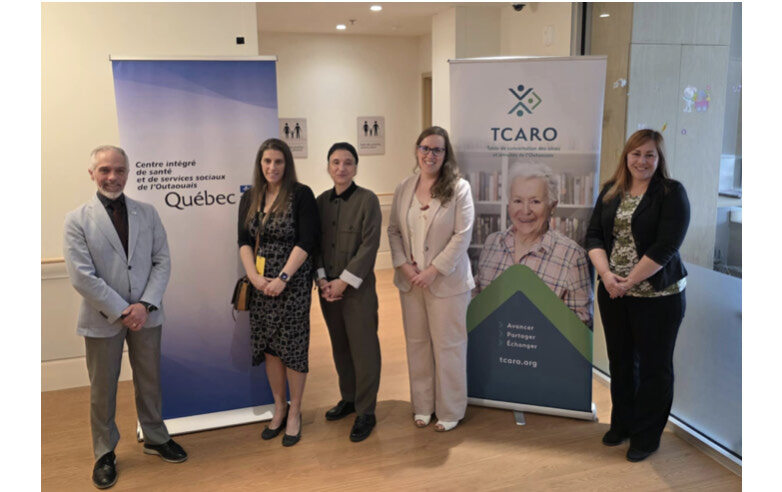
During a press conference with Dr. Marc Bilodeau, Isabelle Léger, Dr. Brigitte Pinard, Dr. Camille Paquette and Patricia Gougeon, officials unveiled a major report urging coordinated efforts across Outaouais to address the pressing health and social needs of its growing senior population. Photo: Tashi Farmilo
As Outaouais ages, public health officials call for collective action
Tashi Farmilo
A new report from the Centre intégré de santé et de services sociaux de l’Outaouais has placed the health and well-being of older adults at the centre of public discourse, revealing a population already feeling the effects of demographic change. Released April 29 at a press conference in Gatineau, the report documents the growing needs of those aged 65 and over in the region and issues a clear appeal: communities must act now to make healthy ageing a shared reality, not an individual burden.
The document, which outlines the health status and living conditions of seniors across the region, shows that the proportion of people aged 65 and older in the Outaouais is rising steadily, projected to increase from 72,000 in 2021 to over 112,000 by 2041. Seniors already make up nearly 18 percent of the population, and in some parts of the region, that threshold has already been surpassed. According to the report, this shift is not merely statistical. It reflects deep social and structural transformations underway and underscores the urgency of preparing physical, social, and institutional environments that can sustain an older and more vulnerable population.
At the press conference, Dr. Brigitte Pinard, regional director of public health, presented the report as both a diagnostic and a framework for collective action. She stressed that the health of older adults cannot be addressed solely through health care delivery, but requires the engagement of all sectors of society. Her remarks pointed to a clear challenge: while many seniors in the Outaouais report satisfaction with their social lives, large numbers are also living with chronic illness, limited mobility, and economic precarity.
The event featured several speakers, including Dr. Marc Bilodeau, Isabelle Léger, Dr. Brigitte Pinard, Dr. Camille Paquette, and Patricia Gougeon, each of whom highlighted different aspects of the report and the importance of community-wide responses to the region’s demographic shift.
The findings show that nearly two-thirds of seniors are inactive or only minimally active. One in two lives with hypertension, and one in four with diabetes. Rates of psychological distress remain high, with close to one-third of older adults experiencing significant emotional strain. Though the vast majority continue to live independently, housing insecurity, inadequate transportation options, and the rising cost of living are pushing many to the margins. Eighteen percent of senior-led rental households face serious housing needs, and one in ten has recently experienced food insecurity. As climate risks grow, seniors—especially those in urban heat islands or isolated rural settings—face compounding threats from heat exposure and limited access to cooling or green spaces.
Tuesday’s event also featured representatives from the Table de concertation des aînés et retraités de l’Outaouais, who collaborated with the public health department in shaping the report. The table will take part in a series of territory-level consultations scheduled for May, intended to adapt the report’s recommendations to the specific realities of local communities.
Officials called for a shift in focus from emergency response to long-term planning, from treatment to prevention, and from fragmented efforts to integrated approaches. Drawing from a new provincial policy framework and an updated model of healthy ageing, the report places older adults not only at the heart of the issue but also at the centre of the solution, proposing the creation of environments that are safe, adaptable, and inclusive—places where seniors can remain engaged, autonomous, and well.
Public health leaders described this work as an ongoing process rather than a finished product, acknowledging the challenges ahead, particularly in balancing limited resources with growing demand. Yet they insisted that the demographic transition now underway in the Outaouais also presents a unique opportunity: in building a region that supports its seniors, the Outaouais will be building a more resilient, connected, and compassionate society for all.
